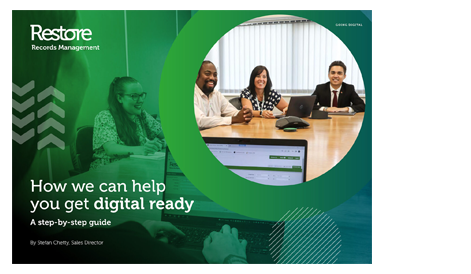
The pros and cons around how NHS Trusts can optimise their records management.
There has been a long-held dream for the NHS to be ‘paperless’ with the government setting a target of 2020 for achieving just that. But that target has long gone – and paper is still here.
So, the question is: where do things stand? And what works best for NHS Trusts right now?
In a world in which rising costs, pressure on resources and increasing demands make life difficult, many Trusts are still searching for the perfect solution.
Stefan Chetty,
Director of Public Sector Services, Restore Records Management
Digital
Of course, going fully digital is the dream, and it’s the right one. For Trusts which have the correct finance, headspace and time to complete digital transformation, it is a good solution.
The ‘pros’ are obvious. Not least fast access to records and the ability to utilise technology and software to improve patient care
But there are issues to consider, too.
The cost of scanning, and the sheer volume of patient and healthcare records, mean it would be prohibitively expensive to take that route for many Trusts, especially in the current climate.
And that’s without taking into consideration the cultural changes required to make it happen.
This has resulted in NHS Trusts exploring other options.
Hybrid
A hybrid solution, achievable by outsourcing document storage for Health Records Libraries, can deliver a wide range of benefits without the full cost of a digital transformation programme and is growing in popularity.
Moving records offsite, putting fast retrieval processes in place and scanning only the files which are needed most often is rapidly becoming a top choice.
It delivers the same end user experience as digitising all legacy paper records, improving efficiency, saving money and freeing up valuable space in hospitals.
We estimate there are over 100 million physical records still stored by NHS Trusts across the country, many of them housed in Health Records libraries sat right in the centre of hospitals – in prime clinical space that could be better used for direct patient care.
Not only that, but for Trusts still managing these libraries themselves, there are often high costs attached and limited tracking systems meaning it’s not unusual for documents to be misfiled.
What’s the solution?
It’s understandable that many Trusts with a digital ambition are considering other, more affordable, ways to modernise and optimise the way patient records are handled, in cases where going fully digital is unattainable.
That’s not to say that digital doesn’t have a role to play or that it does not remain a long-term goal But there are significant differences between NHS Trusts in where they stand on the paperless journey and how quickly they can get there.
In short, when it comes to patient records management, there is no ‘one size fits all’ approach.
At present, it seems that optimising a hybrid approach in which digital and physical records live efficiently side by side, is the winning choice for many. This can also make it easier, and cheaper, to complete digital transformation at a later date, or at a pace which is more realistic.
Find out more about how you can optimise your patient records by reading our white paper here
Further insights



